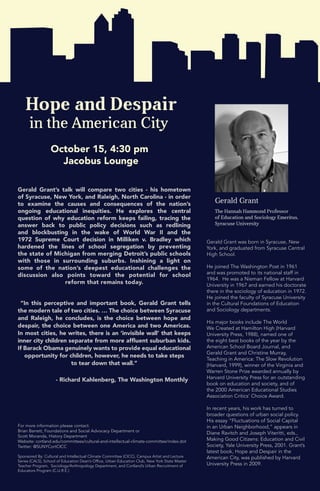Recommended
Recommended
More Related Content
Similar to grant
Similar to grant (20)
Promoting artmaking to dev empathic sch lders nfmij v16 n1, 2019

Promoting artmaking to dev empathic sch lders nfmij v16 n1, 2019
Aler 2018 louisville female characters social justice(4)

Aler 2018 louisville female characters social justice(4)
Transnational Media PracticesGlocalization and Counterflows Assi.docx

Transnational Media PracticesGlocalization and Counterflows Assi.docx
Talkin bout a Revoluition: New Literacies, New Practices

Talkin bout a Revoluition: New Literacies, New Practices
Classed Out The Challenges of Social Class in Black Communi.docx

Classed Out The Challenges of Social Class in Black Communi.docx
i m Poverty Race, o f L o w - S k i l l e d gers at the.docx

i m Poverty Race, o f L o w - S k i l l e d gers at the.docx
Bullying in The Age of The Wall: Trump and the digital radicalisation towards...

Bullying in The Age of The Wall: Trump and the digital radicalisation towards...
Consider these examples, reviewed in Life Span Development by Jo

Consider these examples, reviewed in Life Span Development by Jo
Solidarity eocnomy building alternatives for people and planet papers and rep...

Solidarity eocnomy building alternatives for people and planet papers and rep...
Being Human Today: Transcontental Border Crossing in the Times of Facebook an...

Being Human Today: Transcontental Border Crossing in the Times of Facebook an...
grant
- 1. Gerald Grant’s talk will compare two cities - his hometown of Syracuse, New York, and Raleigh, North Carolina - in order to examine the causes and consequences of the nation’s ongoing educational inequities. He explores the central question of why education reform keeps failing, tracing the answer back to public policy decisions such as redlining and blockbusting in the wake of World War II and the 1972 Supreme Court decision in Milliken v. Bradley which hardened the lines of school segregation by preventing the state of Michigan from merging Detroit’s public schools with those in surrounding suburbs. Inshining a light on some of the nation’s deepest educational challenges the discussion also points toward the potential for school reform that remains today. Gerald Grant Gerald Grant was born in Syracuse, New York, and graduated from Syracuse Central High School. He joined The Washington Post in 1961 and was promoted to its national staff in 1964. He was a Nieman Fellow at Harvard University in 1967 and earned his doctorate there in the sociology of education in 1972. He joined the faculty of Syracuse University in the Cultural Foundations of Education and Sociology departments. His major books include The World We Created at Hamilton High (Harvard University Press, 1988), named one of the eight best books of the year by the American School Board Journal, and Gerald Grant and Christine Murray, Teaching in America: The Slow Revolution (Harvard, 1999), winner of the Virginia and Warren Stone Prize awarded annually by Harvard University Press for an outstanding book on education and society, and of the 2000 American Educational Studies Association Critics’ Choice Award. In recent years, his work has turned to broader questions of urban social policy. His essay “Fluctuations of Social Capital in an Urban Neighborhood,” appears in Diane Ravitch and Joseph Viteritti, eds., Making Good Citizens: Education and Civil Society, Yale University Press, 2001. Grant’s latest book, Hope and Despair in the American City, was published by Harvard University Press in 2009. Hope and Despair in the American City The Hannah Hammond Professor of Education and Sociology Emeritus, Syracuse University “In this perceptive and important book, Gerald Grant tells the modern tale of two cities. … The choice between Syracuse and Raleigh, he concludes, is the choice between hope and despair, the choice between one America and two Americas. In most cities, he writes, there is an ‘invisible wall’ that keeps inner city children separate from more affluent suburban kids. If Barack Obama genuinely wants to provide equal educational opportunity for children, however, he needs to take steps to tear down that wall.” - Richard Kahlenberg, The Washington Monthly October 15, 4:30 pm Jacobus Lounge Sponsored By: Cultural and Intellectual Climate Committee (CICC), Campus Artist and Lecture Series (CALS), School of Education Dean’s Office, Urban Education Club, New York State Master Teacher Program, Sociology/Anthropology Department, and Cortland’s Urban Recruitment of Educators Program (C.U.R.E.) For more information please contact: Brian Barrett, Foundations and Social Advocacy Department or Scott Moranda, History Department Website: cortland.edu/committees/cultural-and-intellectual-climate-committee/index.dot Twitter: @SUNYCortCICC
